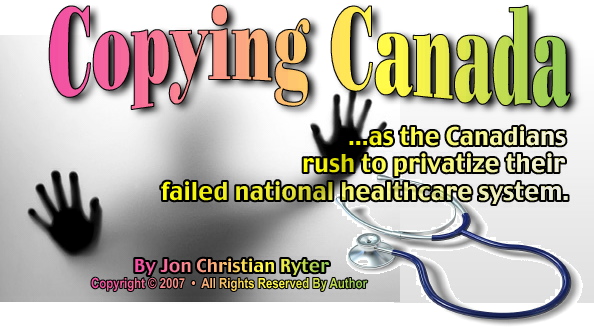
News
Behind the Headlines
Two-Cents Worth
Video of the Week
News Blurbs
Articles
Testimony
Bible Questions
Internet Articles (2015)
Internet Articles (2014)
Internet
Articles (2013)
Internet Articles (2012)
Internet Articles (2011)
Internet Articles (2010)
Internet Articles
(2009)
Internet Articles (2008)
Internet Articles (2007)
Internet Articles (2006)
Internet Articles (2005)
Internet Articles (2004)
Internet Articles (2003)
Internet Articles (2002)
Internet Articles (2001)


As Hillary, Edwards and Obama talk about socialized medicine, Canada is trying to jettison its public health system in order to give its citizens a healthcare system that works.
 ouldn't
you know it? Although the Canadian healthcare system has failed,
America's far left still thinks socialized medicine is good for
everyone simply because everyone would be covered (whether they
want to or not) and, because everyone (except their poor constituents)
would be forced to pay exorbitant taxes to the federal government
to finance it. It would also be very good for government since it
would promulgate the bureaucracy. When
she carried the self-ascribed title of co-president (and took the
job description just a little too seriously for most of official
Washington, DC), Hillary Clinton—with the help of strategist
Ira Magaziner—forged the legislation known as the Health
Security Act of 1993 that would have nationalized 1/7th of the
US economy if it had made it through the Democratically-controlled
Congress. As
the media hawked the Health Security Act, they constantly
pointed out that our neighbor to the north, Canada, has had national
socialized medicine for 28 years, beginning with the passage of
the Orwellian healthcare system—the Canada Health Act—that
covered 100% of its citizens. It was an Orwellian victory any
utopian socialist—but no one else—would be proud of.
ouldn't
you know it? Although the Canadian healthcare system has failed,
America's far left still thinks socialized medicine is good for
everyone simply because everyone would be covered (whether they
want to or not) and, because everyone (except their poor constituents)
would be forced to pay exorbitant taxes to the federal government
to finance it. It would also be very good for government since it
would promulgate the bureaucracy. When
she carried the self-ascribed title of co-president (and took the
job description just a little too seriously for most of official
Washington, DC), Hillary Clinton—with the help of strategist
Ira Magaziner—forged the legislation known as the Health
Security Act of 1993 that would have nationalized 1/7th of the
US economy if it had made it through the Democratically-controlled
Congress. As
the media hawked the Health Security Act, they constantly
pointed out that our neighbor to the north, Canada, has had national
socialized medicine for 28 years, beginning with the passage of
the Orwellian healthcare system—the Canada Health Act—that
covered 100% of its citizens. It was an Orwellian victory any
utopian socialist—but no one else—would be proud of.
In fact, it was so Orwellian that Canadians living elsewhere in the world are still required to be covered. Just like the mandates in Hillary's proposed Health Security Act had it been enacted in 1993. And, like Hillary's Health Security Act, the Canadian healthcare system determined when it was pointless to waste the taxpayer's money funding health care for chronic, end-of-life conditions— conditions like terminal cancer, the final stages of AIDS, and just plain old "old age" since under the failed Clinton plan, old age is considered a terminal medical condition. Government, in Hillary's mind, must have the right to determine when its pointless to waste the taxpayers' money treating a patient who can only improve medically but never "get better."
Until the last few years, the medical community of Canada was convinced that the medical system in Canada was on par with that in the United States—even though Canadians have historically flooded across the border to seek medical attention in the United States—particularly when they were faced with life-threatening medical conditions, most of which would have required an extended waiting period in Canada.
When you
compare the training and proficiency of healthcare providers in
Canada to those of the United States there's little or no difference.
Although they are not quite as innovative, Canadian doctors are
every bit as capable as US doctors, and Canadian healthcare facilities
are every bit as good as US hospitals.  The
biggest differences between the private healthcare system in the
United States and the public healthcare system of Canada are found
in the area of personal cost—and the wait. The US healthcare
system—due largely to the extraordinary cost of malpractice
insurance—is far more expensive than the Canadian universal
healthcare system. But at least in the United States, if you have
a heart attack and need bypass surgery, that lifesaving operation
is performed within hours—not months or years.
The
biggest differences between the private healthcare system in the
United States and the public healthcare system of Canada are found
in the area of personal cost—and the wait. The US healthcare
system—due largely to the extraordinary cost of malpractice
insurance—is far more expensive than the Canadian universal
healthcare system. But at least in the United States, if you have
a heart attack and need bypass surgery, that lifesaving operation
is performed within hours—not months or years.
Healthcare costs are kept artificially low in Canada because the government is the provider. Private insurance companies (which insure human life and property) are discouraged from offering health insurance policies. Six Canadian provinces—Alberta, British Columbia, Manitoba, Ontario, Nova Scotia and Quebec—have banned insurance companies from offering health insurance to their policyholders. The other four Canadian provinces have laws that discourage private insurers from offering health plans while a national law makes it illegal for Canadian citizens to pay for health care that is [a] deemed medically necessary and [b] is provided by either the provincial or national government. Yet, scores of Canadians purchase health insurance coverage in the United States every year because, increasingly, the medical orthodoxy of the Canadian healthcare system is being challenged by patients and doctors alike. Even without private healthcare coverage, more and more Canadians cross the border every year to have critically-needed medical procedures done in the United States.
While the largest number of healthcare seekers come to the United States want elective cosmetic surgery, many of those who come need lifesaving procedures that are not available to them in Canada, or that are not available to them quick enough to prolong their lives. Patients seeking plastic surgery at Canadian hospitals have an average wait of 35.4 weeks—over 8 months—before the procedure can be done. While there is an average delay of 10 weeks for any surgery, women with gynecological problems are forced to wait at least 14 weeks after they are diagnosed before surgery can be done. Those requiring ophthalmological surgery will generally wait 27.3 weeks. If you need orthopedic surgery, you will likely wait at least 40 weeks before the bone doctor goes to work on you. If you need neurosurgery, the odds are pretty good you will wait up to 32 weeks for the procedure you need to save your life. If you need cardiac surgery, you only have to wait 8 weeks. When the cancer time bomb is ticking inside your body, you will still wait at least 5 weeks for surgery—and an additional 5 weeks before you can start radiation therapy.
Michael Moore, who uses his propaganda skills as a film maker, ignores the monumental problems with the Canadian healthcare system and calls the US healthcare system "sick." In his new documentary "Sicko," Moore portrays the US healthcare system as inferior to that of Canada. All of the top tier 2008 Democratic presidential contenders propose slightly different versions of a universal healthcare system for Americans if they get elected. And, as US politicians—who argue that only the United States and Mexico are the only two developed countries in the world without universal healthcare—are struggling to develop a system that won't bankrupt the treasury coming out of the chute, the Canadians are fighting the socialist bureaucracy in Canada to undo 28 years of bad medical law to privatize their failing public healthcare system.
Under the current system—which is actually a hodgepodge of different socialized healthcare plans—every Canadian citizen (with a few exceptions) regardless of their medical history, income or standard of living, is entitled to precisely the same access to hospitals, the same medical treatment from primary care physicians, and the same eye and dental care as anyone else. The government pays 70% of the cost, the patient pays 30%. The problem with the Canadian system is not centered on the exorbitant cost to the taxpayer—who not only pays a stiff tax for the coverage, but 30% of the cost for the treatment as well—but, rather, on the inability of the Canadian system to deliver medical services in a timely fashion. The bureaucrats in Canada are fighting the current attempts to privatize the system because they believe privatization will lead to "inequality" in healthcare with wealthier Canadians being able to buy certain treatments or more "deluxe" services than the poor. As it is today, the wealthier Canadians simply get on a plane and fly to Johns Hopkins, the Cleveland Clinic, or some other major US medical center specializing in their particular disease or disorder—without a 6 to 40 week wait for surgery.
Over the last couple of decades private clinics offering specialized services began popping up in various Canadian provinces. Private health insurance plans, which have always existed to help defray the patient's portion of the healthcare bill, and which are generally offered as part of employee benefits packages in most Canadian companies, are now being used to defray a portion of the cost for care in private facilities.
Even though they do so, under federal law in Canada, private clinics cannot legally provide any medical procedure that is covered by the Canada Health Act since that could be construed as offering better medical care to those who could afford private care than that which is generally available under the public health system. For example, if you needed an MRI or Petscan, you could be forced to wait several months at a public health system hospital or clinic. In a private clinic, the doctor would order the test one day and the MRI, catscan or Petscan could be scheduled for the next day—like it is here in under our archaic private healthcare system that Hillary, John and Barack want to change for us.
The Hillary Clinton Health Security Act of 1993 was modeled after the Canadian healthcare system—which is touted by the Canadian government as the best public healthcare system in the world because, the Canadian government noted, the average lifespan of a Canadian is 80.1 years—higher than it is in the United States. The average lifespan for men in the United States is 79.8 years. Longevity is lifestyle related. The fact that the average Canadian lives 3 months longer than an American is not because healthcare is better in Canada than it is in the United States since nothing could be farther from the truth. If it was, Canadian citizens and Canadian physicians would not be suing the Canadian government for the right to purchase personal health care outside of the Canadian healthcare system.
 Two
years ago a 47-year old Canadian physician, Dr. Jacques Chaoulli,
sued the provincial Quebec government for the right of his patients
to buy health care on their own. Chaoulli is one of a growing
number of doctors in Canada who have opted out of the provincial
healthcare system. Because he opted out, the Quebec Health Care
Act prohibits him from providing private medical services in
public health hospitals—which all Canadian hospitals are.
Two
years ago a 47-year old Canadian physician, Dr. Jacques Chaoulli,
sued the provincial Quebec government for the right of his patients
to buy health care on their own. Chaoulli is one of a growing
number of doctors in Canada who have opted out of the provincial
healthcare system. Because he opted out, the Quebec Health Care
Act prohibits him from providing private medical services in
public health hospitals—which all Canadian hospitals are.
Dr. Chaoulli purchased a mobile operating room—a large white van with "Emergency Medicine 24 Hours" painted in large block letters on both sides of the vehicle. The van, equipped with portable electrocardiogram, an X-ray machine and intravenous equipment needed to give a lifesaving blood transfusion sat, unused, in the driveway of Dr. Chaoulli's home. The Quebec government told the physician is was unlawful for him to use the van—and it is unlawful for the physician to accompany his "emergency" patients to the hospital since he opted out of Quebec's healthcare system and was deemed, by the government, as no longer certified under the public health system. Physicians who opt out of Quebec's public health system, are prohibited under the Quebec Health Care Act from providing private medical services in public health hospitals. In addition, the Quebec Hospital Insurance Act denies the patients of private practice doctors from buying insurance to cover their private medical costs.
When he filed his original lawsuit in Quebec's Superior Court, Chaoulli said that he did so only because he felt he had an obligation to his patients. He argued that the terms of the Quebec Health Care Act violated his rights as a Canadian physician, and the personal and professional freedoms of Quebecers who came to him for medical care. After two years, the case—now referred to by the Canadian media as the Chaoulli Decision—arrived at the arch-liberal Supreme Court of Canada [SCC] where all of the pundits predicted Chaoulli's argument would fall on deaf ears.
The SCC shocked everyone—particularly the bureaucrats who have controlled Canada's healthcare system with an iron hand since 1984. On June 9, 2007 in a 4 to 3 opinion, the high court struck down the 23-year old law and gave private practice physicians in Canada a resounding victory. The 3-member minority argued it was not the job of the court to settle long-standing debates between private enterprise the the public health care system.
 SCC
Chief Justice Beverley McLachllin and Justice John Major
(who wrote the majority opinion) said: "The evidence in
this case shows that delays in the public health care system are
widespread, and that, in some serious cases, patients die as a result
of waiting lists for public health care." Their decision
was only the first chorkle of a death thrall that could take up
to a decade since before the public health system can be partially
dismantled—into a public health system for the poor and the
elderly similar to that in the United States—all ten Canadian
provinces and Canada's three territories must align their health
care systems to comply with the Chaoulli Decision. And private
insurance companies must now step up to the plate with new insurance
products modeled after those used in the United States.
SCC
Chief Justice Beverley McLachllin and Justice John Major
(who wrote the majority opinion) said: "The evidence in
this case shows that delays in the public health care system are
widespread, and that, in some serious cases, patients die as a result
of waiting lists for public health care." Their decision
was only the first chorkle of a death thrall that could take up
to a decade since before the public health system can be partially
dismantled—into a public health system for the poor and the
elderly similar to that in the United States—all ten Canadian
provinces and Canada's three territories must align their health
care systems to comply with the Chaoulli Decision. And private
insurance companies must now step up to the plate with new insurance
products modeled after those used in the United States.
When Chaoulli challenged Quebec's monopoly on healthcare, one of his private practice patients, George Zeliotis, a retired businessman joined him as co-plaintiff. Zeliotis argued that he's a casualty of the existing system. The 67-year-old retired businessman told the court he waited almost a year for hip-replacement surgery in 1997. While he was on the waiting list for surgery, he was immobile and in great distress. He told the court that he appealed to politicians, hospital administrators—and even the media—for help. "The pain was intolerable," he told the media during a break in the trial. He said he would have gladly paid for private surgery had it been legal. "At night I couldn't sleep. The only thing to relieve my pain was the surgery. There was no choice. Day by day I was hoping the telephone would ring and someone would help me. Any future surgery could [also] be delayed. I wouldn't be able to govern my life."
Zeliotis hired a lawyer to plead his case. Chaoulli represented himself. One of Chaoulli's key witnesses was Dr. Edward Coffey, past president of the Quebec Medical Association—and a longstanding advocate of parallel private and public health care systems in Canada. Coffey told the court that Canada was the only industrialized nation in the world not to offer its citizens a choice between public and private health care.
 Keep
that mind when Hillary, John and Barack argue
that the United States and Mexico are the only industrialized nations
that do not offer universal healthcare. No other industrialized
nation except their healthcare "model"—which has
failed—mandates that the citizens of that nation must use the
State's universal healthcare system to the exclusion of any private
system. Hillary's Health Security Act would have required
every American to use the public health system—or go without
treatment. No private practice physician under Hillary's
Health Security Act would have been allowed to treat a patient
who was declined for a procedure by the public health system.
Keep
that mind when Hillary, John and Barack argue
that the United States and Mexico are the only industrialized nations
that do not offer universal healthcare. No other industrialized
nation except their healthcare "model"—which has
failed—mandates that the citizens of that nation must use the
State's universal healthcare system to the exclusion of any private
system. Hillary's Health Security Act would have required
every American to use the public health system—or go without
treatment. No private practice physician under Hillary's
Health Security Act would have been allowed to treat a patient
who was declined for a procedure by the public health system.
Dr. Coffey testified that "...in a parallel, noncompetitive health insurance system, everyone pays into the universal public system but also has the option of paying for private health insurance." He countered the criticism of the government's lawyers that allowing private and public health insurance to coexist would create one system for the rich and another for the poor. "It is not only the wealthy who buy insurance," Coffey said. "Almost half the private insurance bought today is purchased by those earning $30 thousand or less." He also noted that an unofficial, two-tiered medical system already existed in Canada and that those with education and "connections" already jump to the front of the line.
According
to the Fraser Institute, on the average in Canada, it takes
20 weeks to get an appointment with a specialist—21 weeks for
a neurosurgeon. However, it only takes about 3 weeks to see an oncologist.
According to Dr. David Gratzer, a registered physician in
the Canadian system,  "If
you're healthy and willing to wait, [the Canadian healthcare system]
is the best system in the world. What you discover," he
added, "is there are wait times in Canada for any condition."
Sadly, many times the waiting period is fatal.
"If
you're healthy and willing to wait, [the Canadian healthcare system]
is the best system in the world. What you discover," he
added, "is there are wait times in Canada for any condition."
Sadly, many times the waiting period is fatal.
Barry Stein, a Montreal lawyer with metastatic colon cancer was just one of a score of witnesses—both patients and family members of deceased patients—who sought medical treatment they could not get because they were on the tail-end of miles long waiting lists in their provinces and could not, under existing rules, go to another province to get treatment. Stein sought medical treatment in New York after being put on a surgery and chemotherapy waiting list. Despite the urgency of Stein's condition, his surgery was postponed 3 times due to hospital overcrowding. The Regie de l'assurance-maladie du Quebec, which is responsible for operating the province's health insurance system, denied his request in 1996 even though the surgical insertion of an internal chemotherapy pump that was not available in Canada, was recommended—and deemed medically necessary. In 1996 Stein asked the Regie de l'assurance-maladie du Quebec to reimburse his expenses for the treatment in the United States. When the government refused, he petitioned Quebec's Superior Court to review their decision. In August 1999—3 years later—the health care system was ordered to reimburse him for the medical costs. Had Stein not been a man of some means, he would have died long before Quebec authorized the payment for help—or the treatment itself.
 Dr.
Daniel Doyle, a Quebec cardiovascular surgeon, described to
the Canadian court how several of his patients, on waiting lists
for bypass surgery, died. The average wait for a bypass was from
six to eight months. An ophthalmologist testified that many patients
go blind while waiting up to 18 months for cataract surgery. The
incidents of patients dying while waiting for treatment are almost
pandemic. Public health officials, who were not concerned before
the Chaoulli Decision, are scrambling to find solutions to
that one issue in order to keep their medical house of cards from
tumbling down around them.
Dr.
Daniel Doyle, a Quebec cardiovascular surgeon, described to
the Canadian court how several of his patients, on waiting lists
for bypass surgery, died. The average wait for a bypass was from
six to eight months. An ophthalmologist testified that many patients
go blind while waiting up to 18 months for cataract surgery. The
incidents of patients dying while waiting for treatment are almost
pandemic. Public health officials, who were not concerned before
the Chaoulli Decision, are scrambling to find solutions to
that one issue in order to keep their medical house of cards from
tumbling down around them.
Colin McMillan, president of the Canadian Medical Association, attributed the long waits to a lack of capacity in the healthcare system on a government austerity program during the 1990s. To save money, the Canadian government curbed the importation of physicians from other countries and cut back on the number of doctors they were willing to train domestically. "We thought there was a surplus of doctors," McMillan admitted, adding, "we thought we could save some money." That's generally what happens when bureaucrats are put in charge of anything other than counting beans in a jar. When bureaucrats are allowed to treat people like numbers, people stop being flesh and blood and simply become statistics.
To Hillary, John and Barack, we are simply demographic statistics. You can see "us" in the colorful spread sheets these plutocrats use to show America how they are going to insure every American like they do in Canada. Every American, regardless of age or health, will be insured—just like they are in Canada. And the New Democrats will will do it for less money than we currently spend in our private insurance plans—just like the Canadians. At the expense of our loved ones—and perhaps us. They will fail. Just like the Canadians.
And, finally, there is a reality about socialized medicine that most people don't want to even contemplate. Government suddenly has control over whether you live or die when you become seriously ill. When the Democratically-controlled Congress passed the Omnibus Budget Reconciliation Act of 1990, they buried an amendment in the budget bill called the Patient Self-Determination Act of 1990. PSDA required hospitals to ask elderly patients and those with severe chronic conditions, or those whose medical conditions would continue to decline, to sign living wills. The legislation was worded in such a way to imply that patients were being allowed to more actively participate in decisions about their own treatment. In reality, the legislation was a euthanasia amendment designed to lighten the bureaucracy's financial obligation for the elderly by [a] euthanizing them when its determined they will likely not improve sufficiently to lead a fairly productive, normal life, and [b] ending the government's obligation to continue sending them Social Security checks. Its pretty much like killing two birds with one stone—if you pardon the pun.
Thank God for selfless, caring Democrats like Hillary, John and Barack. Hope we all live long enough under their universal healthcare plans to appreciate them for their selflessness.

Copyright © 2009 Jon Christian Ryter.
All rights reserved.


